by Victoria Masterson*
Barely a week goes by without a new report on the price the world will have to pay if it does not cut emissions rapidly. But what is the price of it actually putting the technology in place to make those massive reductions?
When it comes to Europe, the cost of switching to clean energy by 2050 will be $5.3 trillion, according to a new report from low-carbon research specialist BloombergNEF (BNEF). Its European Energy Transition Outlook 2022 models two clean energy pathways out of Europe’s current energy crisis.
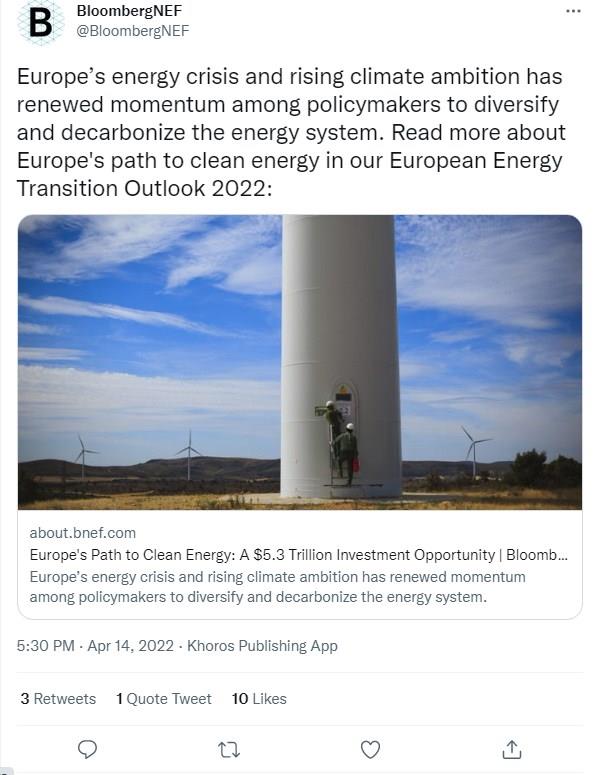
The need for Europe to find alternative sustainable energy sources has intensified this year because of Russia’s invasion of Ukraine. Russia is the leading supplier of natural gas, oil and coal to the European Union, and the war has made supplies uncertain and sent prices soaring.
Clean energy alternatives
BNEF’s report models two alternative energy futures for Europe – an “Economic Transition Scenario” and a more ambitious “Net Zero Scenario”.
In the Economic Transition Scenario, Europe’s use of fossil fuels drops by 28% by 2050. A collapse in coal use is the biggest contributor, while the rise of electric vehicles helps to cut oil demand by 30% by 2050.
However, natural gas demand falls by only 5% over the same period. This is because of “limited economic alternatives” to gas for heating buildings, BNEF says. It also predicts that any falls in gas demand will start to flatten out after 2030.
Fossil fuels will continue to make up 60% of Europe’s energy mix by 2050 in this scenario – a relatively small reduction from 69% in 2022.
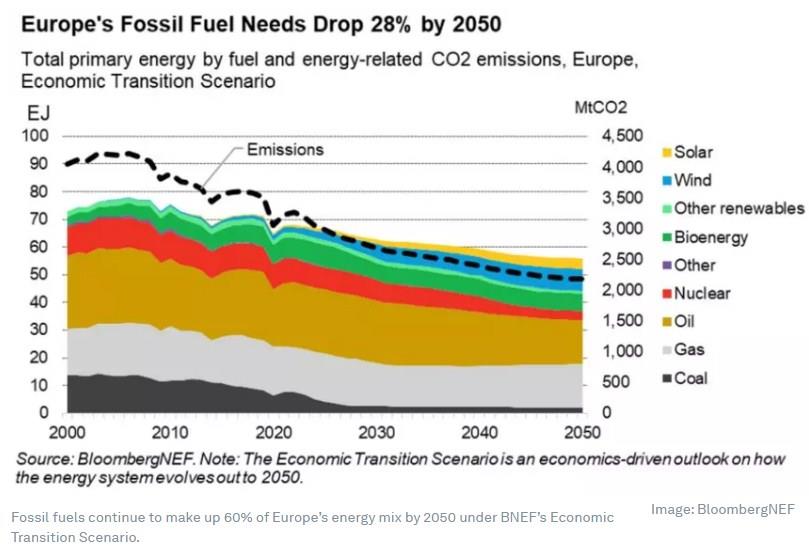
Europe’s net zero opportunity
In contrast, BNEF’s Net Zero Scenario for Europe sees fossil fuels completely driven out by 2050. This is enabled by a switch to electrification and green hydrogen – a type of energy produced using water and renewable power.
Wind and solar become Europe’s main source of energy in this scenario. They replace fossil fuels and remove energy-related carbon emissions as a result.
To reach this Net Zero Scenario, Europe needs “a rapid decline in oil and gas consumption” this decade, BNEF notes. This includes a cut of more than 50% in oil demand.
Europe would need to promote take-up of electric vehicles, heat pumps and electrified industrial processes to make this happen, the report says.
Wind and solar made up 18% of Europe’s energy mix in 2021, but combined with battery storage this could reach 70% by 2035, BNEF’s Net Zero Scenario suggests.
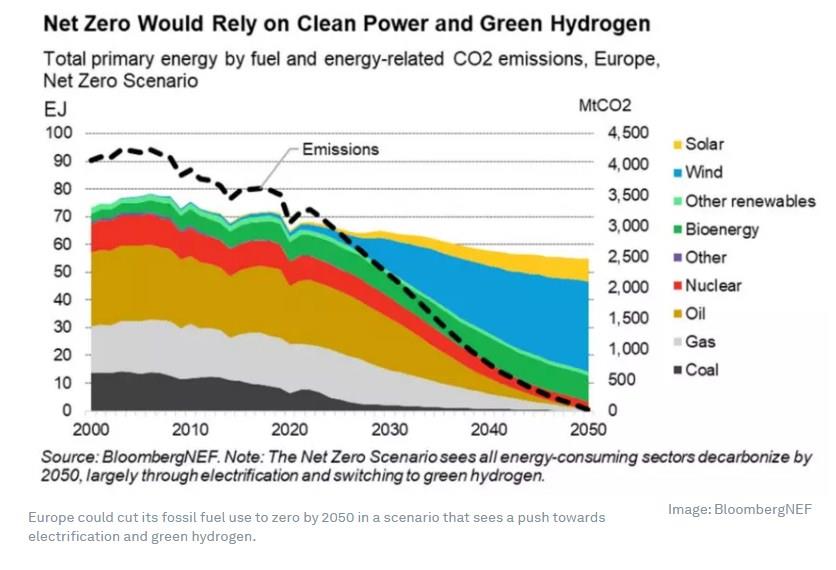
Solar, wind and hydrogen investment needed
To be on track for this, Europe needs to double its solar and onshore wind power capacity by 2025, compared with 2016-20. And it will need to add another 60-80% on top of that between 2026 and 2030, according to the report.
“Most new gas plants built in Europe need to be hydrogen-compatible,” BNEF adds. “Converting existing gas plants to burn hydrogen is also an option.”
Green hydrogen can reduce emissions in sectors where electrification is difficult, BNEF says. Europe needs to develop “hydrogen-ready infrastructure” to achieve this, which means having hydrogen-powered transport and storage infrastructure, for example.
More wind and solar infrastructure would also be needed to produce this scale-up in green hydrogen use.
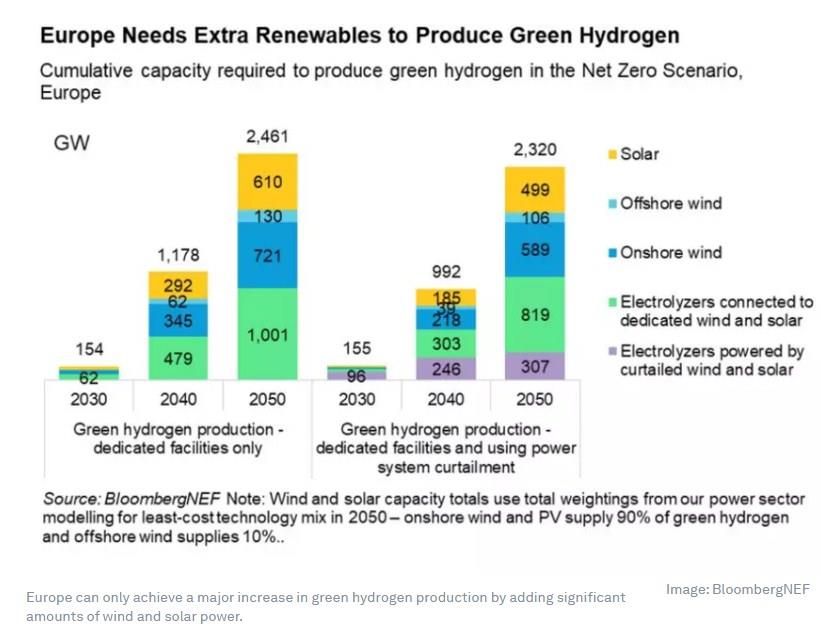
In total, Europe needs $3.8 trillion of investment in new power generation projects – especially wind and solar – between 2021 and 2050, BNEF suggests. It also needs to spend $1.5 trillion over the same period on facilities to produce clean hydrogen.
The price may be high, but the price of failing to change could be even higher.
*Senior Writer, Formative Content
**first published in: www.weforum.org



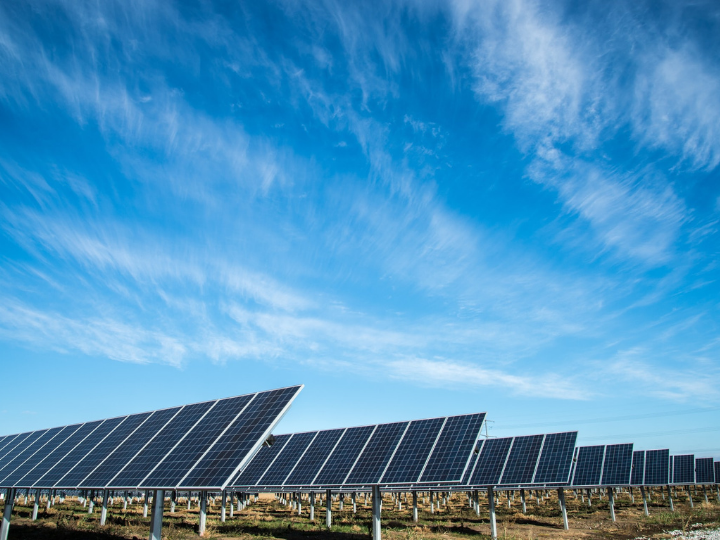
 By: N. Peter Kramer
By: N. Peter Kramer
